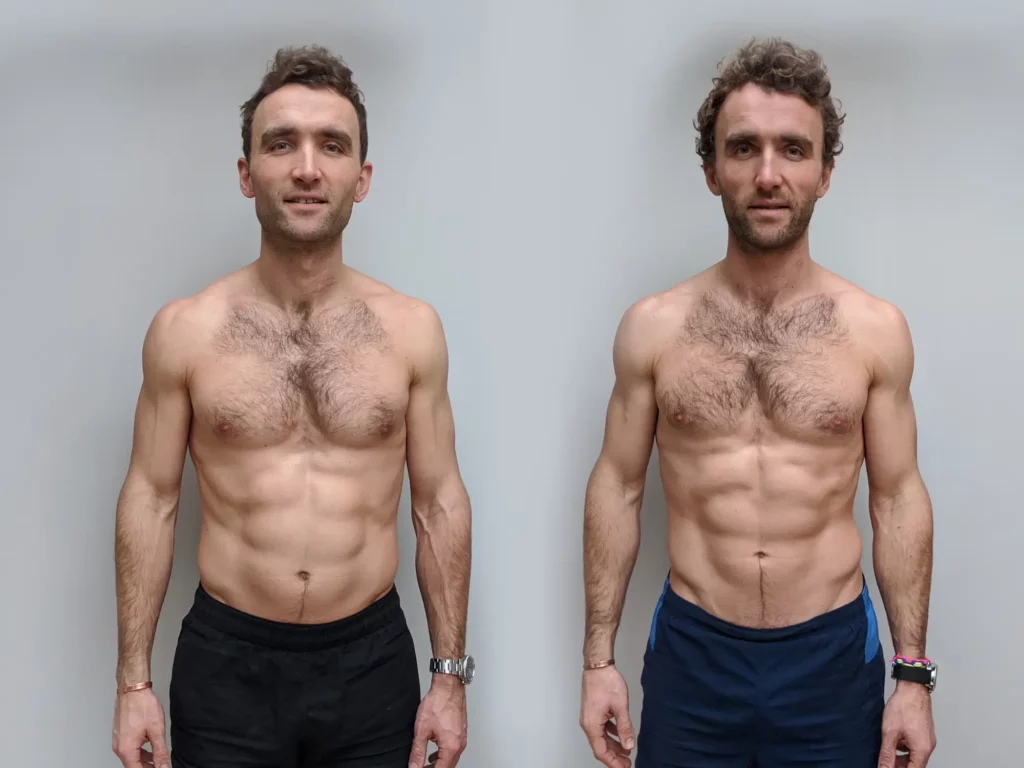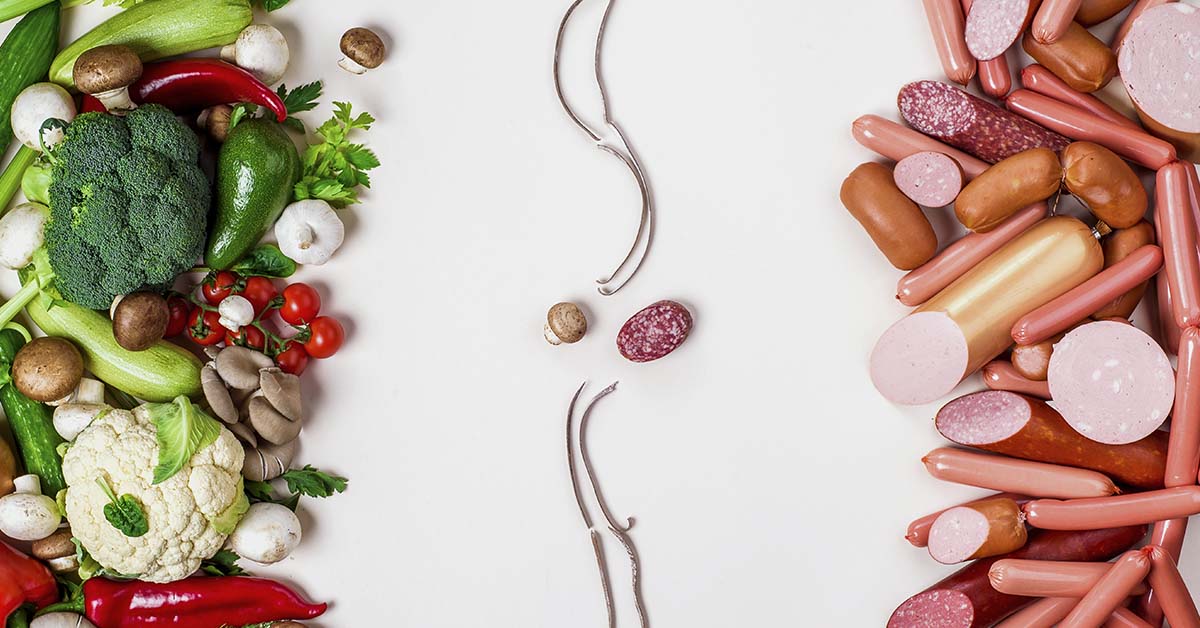Hugo and Ross Turner
Known for their daring expeditions, identical twins Hugo and Ross Turner decided to undertake a different kind of adventure; this time, it was a dietary exploration.1 In 2020, They set off comparing the effects of a vegan diet and an omnivorous diet on two genetically identical individuals- themselves. Their motivation for this unique 12-week experiment, from January to March, was stirred by the increasing popularity and controversy of vegan diets among athletes, as highlighted in documentaries such as “The Game Changers.”2
The twins kept their fitness training regime consistent to ensure fairness and eliminate bias. Ross, who is a personal trainer, designed the program, which involved endurance training five to six days a week. Their meals were prepared by the Mindful Chef delivery service, ensuring they consumed a nearly identical number of calories each day. While Hugo committed to a vegan diet, Ross followed an omnivorous diet. Researchers from King’s College, London, monitored their basic health metrics, such as weight, cholesterol levels, and muscle mass, over the course of the experiment.

The Advantages of Embracing a Vegan Diet
A plant-based diet, rich in whole, unprocessed foods, decreases the likelihood of developing heart disease and enhances overall well-being.
Primarily composed of vegetables, fruits, legumes, whole grains, nuts, and seeds, this diet is low in saturated fats and full of heart-friendly fats and dietary fiber. Additionally, these plant-based foods provide our body with essential vitamins, minerals, antioxidants, and phytochemicals, all of which collectively strengthen our defense against various diseases.3
Several studies illustrate that vegan diets are linked to a decreased risk of heart disease. Individuals following a vegan or vegetarian lifestyle generally have lower blood pressure and LDL (bad) cholesterol levels compared to non-vegetarians. Certain research also suggests that well-structured vegan and vegetarian diets can aid in regulating blood sugar levels and potentially decrease body inflammation.
It is important to note that while these plant-based diets contribute to health improvement, the overall healthier lifestyles often associated with vegans and vegetarians, such as increased physical activity and reduced alcohol intake, also significantly reduce health risks.
Read: Eating This Fruit Has Been Associated With Lower Risk Of Cardiovascular And Coronary Heart Disease
Unveiling The Turner’s Results
As the weeks passed, the brothers started noticing some significant changes. Hugo, after adopting the vegan diet, reported feeling more energized during his gym sessions and noted improved mental focus, a stark contrast from his previous routine. He attributed this to a shift in his snacking habits – he replaced biscuits and chips with fruits and nuts, given the latter’s vegan-friendly nature.
One of Hugo’s dietary changes’ more striking results was his weight and body fat reduction. He started the experiment at about 185 pounds and 13% body fat but ended up weighing 181 pounds, with a drop in body fat percentage to 12%. He also noticed a reduction in his cholesterol levels. However, there was a noticeable downside – Hugo experienced a marked decline in his libido while on the vegan diet.4
Ross, who was slightly bigger than his brother to start with, noticed different results. Adhering to an omnivorous diet, he gained 10 pounds of muscle but also saw an increase in fat, which raised his body fat percentage to 15%. Unlike Hugo, Ross’s cholesterol levels remained consistent throughout the experiment.
Read: 17 Foods High in Magnesium You NEED in Your Diet (see list)
The Gut Microbiome
The vegan diet also induced interesting changes in Hugo’s gut microbiome, the population of beneficial bacteria within the human digestive system. According to fecal sample analysis performed by Atlas Biomed, Hugo’s microbiome changed in ways that potentially increased his resistance to chronic illnesses such as obesity and type 2 diabetes. Surprisingly, both twins observed a decrease in microbial diversity in their gut, a factor usually associated with reduced resilience against certain chronic illnesses like Crohn’s disease.
The twins acknowledged that a 12-week period is relatively short for a typical dietary study. They expressed that, given a chance to repeat the experiment, they would prefer to conduct the trial over six months to a year for more accurate and comprehensive data. Despite the short duration, the experiment was enlightening, and the brothers expressed their intention to incorporate more plant-based foods into their diet moving forward.
In conclusion, they believe the optimal diet is a blend of plant- and animal-based foods. The experiment underscored that both diets have benefits, and neither one was superior overall. Hugo and Ross suggest starting small by replacing snacks with vegan alternatives for those considering a vegan diet. They aim to encourage individuals, specially dedicated meat-eaters, to broaden their dietary horizons and consider plant-based substitutes.
The Turner twins’ unique dietary journey adds to their repertoire of fascinating experiments. From scaling Mt. Elbrus in Europe in 2015 to replicating Sir Ernest Shackleton’s 1914 expedition in Greenland using vintage gear, the Turner twins continue to inspire and educate the world about the potential of the human body, mind, and spirit.
Contemplating the Switch to a Vegan Diet?
To reap the benefits of plant-based foods, you do not necessarily need to transition completely to a vegan or vegetarian lifestyle. For many individuals, simply incorporating more plant-based foods and reducing the intake of processed foods in their everyday diet can bring substantial improvements in health and reduce the risk of heart disease.
A diet rich in vegetables and fruits, regardless of meat or dairy consumption, is linked to a decreased likelihood of heart disease and premature mortality.
Globally, various dietary patterns that incorporate different amounts of meat and dairy help with longevity and more robust health. Examples from the ‘Blue Zones’ include the traditional Mediterranean diet, the vegetarian diet of the Seventh-Day Adventists, and the largely plant-based diet of Okinawans in Japan. A common characteristic among these diets is their primary reliance on plant-based foods.
Keep Reading: Things You Should Know Before Taking a Collagen Supplement
Sources
- “Is a vegan diet healthier than eating meat and dairy?” BBC. November 24, 2021.
- “Identical twins compared a vegan diet with meat-eating and found the vegan diet led to fat loss and more energy.” Insider. Gabby Landsverk. June 1, 2020.
- “Plant-based, vegetarian and vegan diets.” Heart Foundation
- “One Twin Went Vegan. The Other Didn’t. Here’s What Happened Next.” Men’s Health. Jamie Millar. May 18, 2020.

